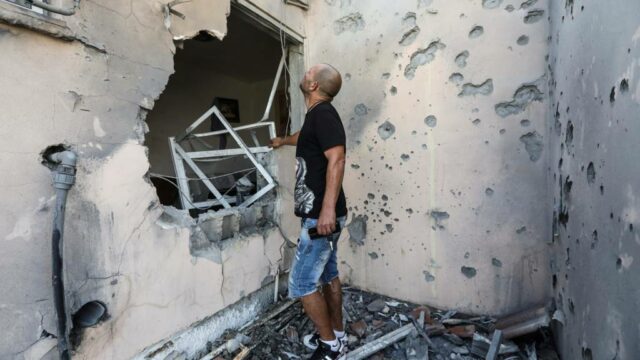Israel’s security cabinet has met amid reports that the government was considering halting its bombardment of Gaza, as international pressure to end the bloodshed gathered momentum.
The country’s public broadcaster, Kan, reported that the cabinet, headed by the prime minister, Benjamin Netanyahu, would vote on a proposed “unilateral ceasefire” to go into effect within 24 hours. Israeli officials did not immediately confirm the report.
In recent days, Israeli media had suggested the military believed its goals had largely been met. Meanwhile, Egypt has been mediating efforts towards a more formal truce and Hamas officials have said a ceasefire was in reach.
Earlier on Thursday, Israel and Palestinian militants halted their fire for several hours. The calm did not last, but previous rounds of fighting have had similar lulls in violence, seen as attempts at trust-building, before an official end in hostilities.
The pause in violence came a day after the US president, Joe Biden, who had largely avoided putting public pressure on Washington’s ally, told Netanyahu that he expected “a significant de-escalation” to take the situation towards a ceasefire.
On Thursday, the White House said it believed Israel had achieved “significant military objectives” and was in a position to wind down operations. “We have seen reports of a move toward a potential ceasefire. That’s clearly encouraging,” the White House press secretary, Jen Psaki, said.
The UN secretary general, António Guterres, added further pressure, calling for an immediate ceasefire and urging Israel’s military to exercise maximum restraint and for Hamas to stop indiscriminate rocket fire.
Guterres described Gaza as “hell on earth” for children, and said he would launch a full humanitarian appeal for funding as soon as possible.
“The hostilities have caused serious damage to vital civilian infrastructure in Gaza, including roads and electricity lines, contributing to a humanitarian emergency. Crossings into Gaza have been closed and power shortages are affecting water supplies,” Guterres said.
Efforts towards a ceasefire are continuing amid growing international calls. France has circulated a UN resolution adding pressure on the US to demand a ceasefire, and issued a joint statement with Egypt and Jordan that “called on the parties to immediately agree on a ceasefire”. They said they would work with the UN and other partners to ensure humanitarian help for the population of Gaza. The US has already said the resolution would “undermine efforts to de-escalate” violence.
The UN Middle East envoy, Tor Wennesland, was meeting the Hamas chief, Ismail Haniyeh, in Qatar, Al Jazeera television reported. The 193-member UN general assembly was due to discuss the conflict on Thursday with the participation of several foreign ministers but was not expected to take action.
One senior Hamas official, Moussa Abu Marzouk, told Lebanon’s al-Mayadeen TV: “I think that the ongoing efforts regarding the ceasefire will succeed. I expect a ceasefire to be reached within a day or two, and the ceasefire will be on the basis of mutual agreement.”
Ronen Bergman, an Israeli military affairs journalist, cited unnamed Israeli officials as saying a ceasefire would be reached within the next 48 hours. The deal would reportedly include Israel agreeing to halt attacks, including attempts to kill senior Hamas members. In return, Hamas would end its rocket attacks, stop digging “attack tunnels”, and halt demonstrations near the frontier.
Since the fighting began on 10 May, Palestinian health officials say 230 people have been killed in aerial bombardments that have worsened Gaza’s already dire humanitarian situation. Israeli authorities put the death toll to date at 12 in Israel, where repeated rocket attacks have caused panic and sent people rushing into shelters.
Earlier, Biden told Netanyahu he expected “a significant de-escalation today on the path to a ceasefire” between Israel and militants in Gaza, in a notable toughening of the US president’s language on the conflict.
The White House said that in a phone call on Wednesday, “the two leaders had a detailed discussion on the state of events in Gaza, Israel’s progress in degrading the capabilities of Hamas and other terrorist elements, and ongoing diplomatic efforts by regional governments and the United States”.
It added: “The president conveyed to the prime minister that he expected a significant de-escalation today on the path to a ceasefire.”
But in a statement issued swiftly after the White House disclosed the call, Netanyahu said he was “determined to continue this operation until its objective is achieved: to restore quiet and security to you, citizens of Israel”.
With Reuters










